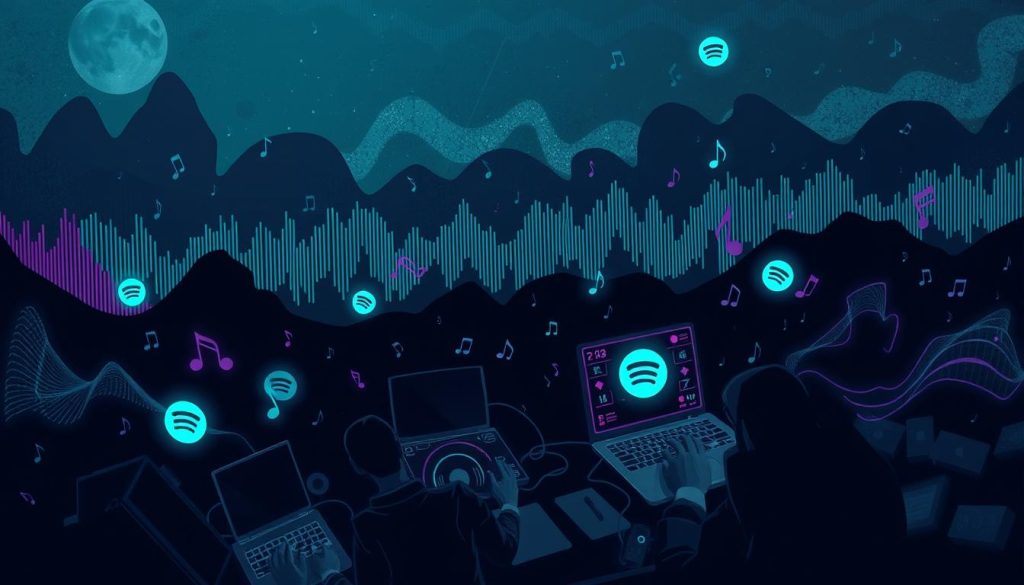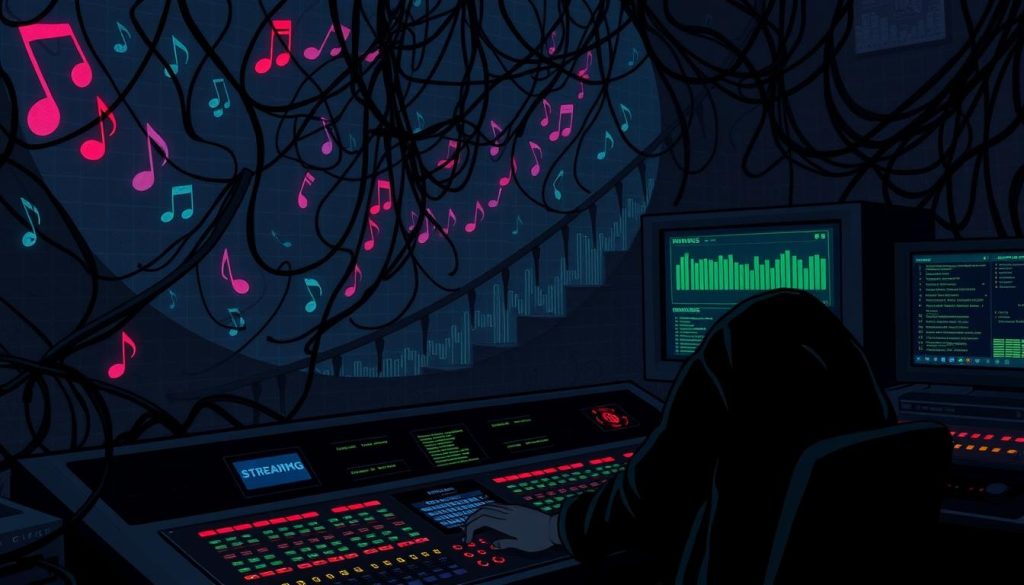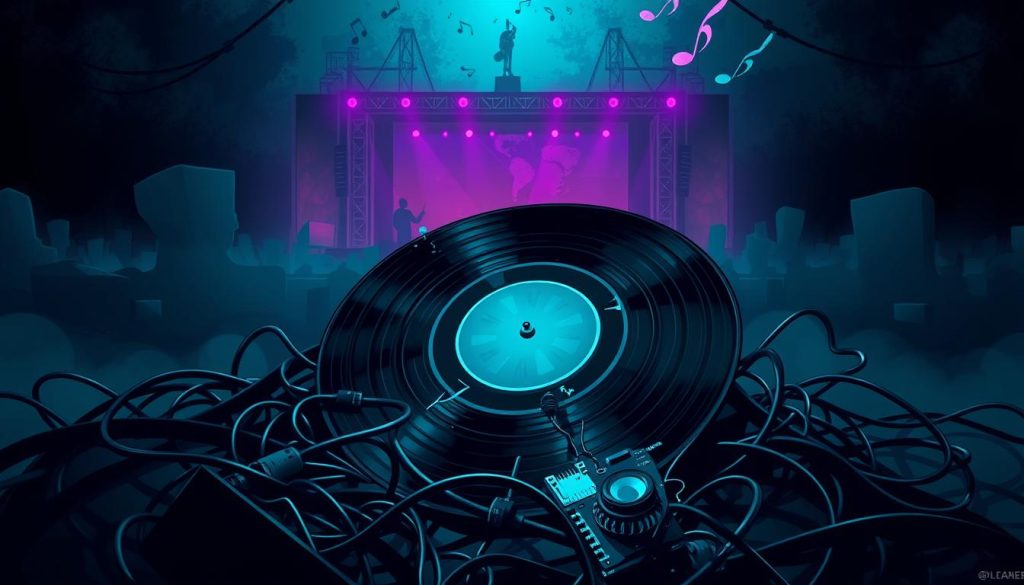In the world of music streaming, success is a constant chase. But beneath this surface, a dark practice has emerged – Spotify botting. This involves using digital tricks to fake stream counts. It has tainted the industry, making artists and listeners doubt the music they hear.
Explore the hidden world of Spotify botting scandals. See how some chase success with unfair means. Learn how artists and their teams fake streams and what it means for you. Discover the big money schemes and shady services behind it all.
Key Takeaways
- Discover the shocking truth about the Spotify botting scandals that the industry doesn’t want you to know.
- Explore the multi-million dollar streaming manipulation scheme and the shady tactics used by playlist promotion services.
- Learn about the risks of Spotify botting for artists, including the withholding of royalties and track removal.
- Uncover the bizarre case of a folkie duo’s amateur album that got hijacked by Spotify botting.
- Understand how digital marketers create thousands of bot-like accounts to generate fake plays and manipulate the system.
The music streaming world has turned into a battleground. Some use unfair means to reach the top. Joshua Mack claimed his “network” can make “200 million streams a month” for artists1. His company, 3BMD, offers services like “streaming playlist PR” and “social media PR.”1
Spotify has removed tens of thousands of releases in January for “artificial streams,”1 harming artists. They face losing royalties and having their tracks removed for faking streams1. Digital marketers make fake accounts to fake plays1. Even big labels like Sony Music Entertainment ban stream manipulation1. The Spotify botting scandal has revealed a dark truth, threatening the streaming world’s very base.
The Bizarre Case of Bad Dog’s Stolen Album
How a Folkie Duo’s Amateur Album Got Hijacked
Bad Dog, a folk duo from Washington, D.C., didn’t aim to make money from their summer album. But soon, “The Jukebox of Regret” appeared on Spotify, Apple Music, YouTube, and more, with new names on the songs. This mix-up was only caught by chance, revealing a big music theft2.
The band’s CD company said their songs’ digital marks were stolen2. This shows the problem of “Spotify botting stories” – using tricks to change music on streaming sites2. With streaming becoming key, these tricks are a big worry2.
Bad Dog’s album theft warns artists about the shady side of spotify playlist promotion and spotify growth hacking2. It shows we need clear rules and honest data in music streaming2.
The music world must tackle these problems directly. We must protect artists like Bad Dog from those who cheat2. Keeping music real and fair is key to keeping fans’ trust2.
spotify botting stories: The Multi-Million Dollar Streaming Manipulation Scheme
Federal investigators have charged a North Carolina musician with a scheme to earn over $10 million in royalties. He used bot accounts and AI-generated songs3. This case marks the first criminal prosecution for artificially inflating music streaming numbers, showing the growing fraud in the music world.
For seven years, the 52-year-old musician Michael Smith ran a complex scheme. He illegally made money from billions of bot-generated streams3. Prosecutors say he used up to 10,000 bot accounts to stream his AI songs, claiming over 4 billion streams and $12 million in royalties since 20193.
Spotify, Apple Music, and YouTube have fought back against such scams. They now charge per track for artificial streams and require more streams before paying royalties3. But Mr. Smith’s operation shows the need for stronger measures against spotify botting stories and music streaming manipulation.
The case has also raised concerns about AI in music. Artists like Billie Eilish and Elvis Costello worry about AI’s “predatory” use. They fear artificial playlist inflation, spotify play count boosting, and spotify chart manipulation3.
“This case is a wake-up call for the music industry. We simply cannot turn a blind eye to the growing threat of streaming manipulation and the abuse of AI technology. The integrity of our charts and the fairness of our royalty payments are at stake.”
The music industry must now take stronger steps against spotify botting stories and other scams. The consequences of not acting could harm both artists and the music world.
The Ugly Truth About Playlist Promotion Services
Exposing the Shady Tactics Used to Game the System
In the world of Spotify, playlist promotion services have become a big business. They promise artists a way to get their music heard by many. But, these services hide a dark side of shady tactics used to game the system4.
These services use bots and fake playlists to make it seem like more people are listening. This makes it look like an artist is more popular than they really are4. Spotify’s algorithms then favor these fake numbers over real fans4.
These services harm the integrity of Spotify and risk artists’ careers. Spotify has started to punish these actions. They charge $10 for any song they think is fake and can even ban a song twice in a short time4.
The effects of these tactics are far-reaching. They hurt not just the artists but the whole music industry. It makes it harder for real musicians to be seen and heard45.
Remember, if something seems too good to be true, it probably is. The truth about Spotify playlist promotion is that the tricks used can harm both artists and the industry4.
“The music industry as a whole suffers, as the platform’s algorithms become skewed, making it increasingly difficult for genuine, hardworking musicians to gain traction and be discovered.”
It’s time to expose the Spotify botting services, Spotify playlist promotion, and Spotify growth hacking tricks. The music industry’s health depends on it6.
The Risks of Spotify Botting for Artists
Spotify botting might seem like a quick fix to boost streams and chart positions. But, the dangers are much greater than any benefits. Spotify warns artists about fake play sites and bot streaming. These can lead to artists unknowingly breaking rules7.
Websites that promise more streams for money might use bots. This can cause Spotify to hold back earnings from these streams7.
Spotify is strict about removing fake streams and chart spots7. They have a smart system to catch bots and watch for odd listening patterns. A team works hard to keep the playing field fair for all artists and creators7.
The penalties for spotify play count boosting and spotify chart manipulation are harsh. Spotify might delete playlists made by those who charge artists for spots. They can also remove music from accounts caught botting7.
Industry experts can spot fake streams easily. This can harm an artist’s career, even scare off big labels8.
Artists should look for real playlist curators who grow followers honestly8. The dangers of spotify botting include ending your career, facing legal trouble, and losing future chances8. It’s better to build real connections with fans than to use fake stream boosts8.
In summary, the risks of spotify botting are too high. Artists should avoid these tactics and work on growing their fan base honestly and sustainably.
Conclusion
The world of Spotify botting stories is complex and often hidden. Artists and industry players use many tactics to increase their Spotify play counts and chart positions. Cases like Bad Dog’s stolen album and huge music streaming scams are slowly coming to light9.
For artists tempted to use Spotify botting, the risks are too high. It can lead to losing money from removed streams and legal trouble9. Spotify chart manipulation also raises big questions. It can give unfair advantages, focus on quantity over quality, and devalue real promotional efforts9.
The industry needs to look at itself and take action. Spotify is fighting fraud with algorithms and manual checks. Those caught buying listens will be banned10. There’s also a push for fairer revenue splits to cut down on fraud10.
By promoting real growth and stopping Spotify botting, the industry can move towards a fairer future. This will benefit all artists and music fans9.
FAQ
What is Spotify botting and how does it work?
How are artists manipulating streams on Spotify?
What are the risks of Spotify botting for artists?
How do playlist promotion services operate, and what are the risks?
What is the landmark case involving Spotify streaming manipulation?
Source Links
- Inside the ‘Black Market’ Where Artists Can Pay for Millions of Streams
- Fake Streams Could Be Costing Artists $300 Million a Year
- Musician charged with using bots to boost streaming revenue
- Warning to Artists: The Spotify-Distrokid Scandal and Its Threat to Independent Music
- The Truth About DistroKid (Review)
- The UGLY TRUTH about SUB BOTS and BUYING SUBSCRIBERS on YouTube (ep 085) by Start Creating Podcast with Alan Spicer
- What happens if you’re caught bot streaming on Spotify? – RouteNote Blog
- 5 Reasons Artists Should Never Buy Fake Streams – Loudlab
- Understanding Spotify Stream Farms: Risks, Strategies, and Ethics
- Are Fake Spotify Streams Real? A Bigger Issue than You Think ⛔



